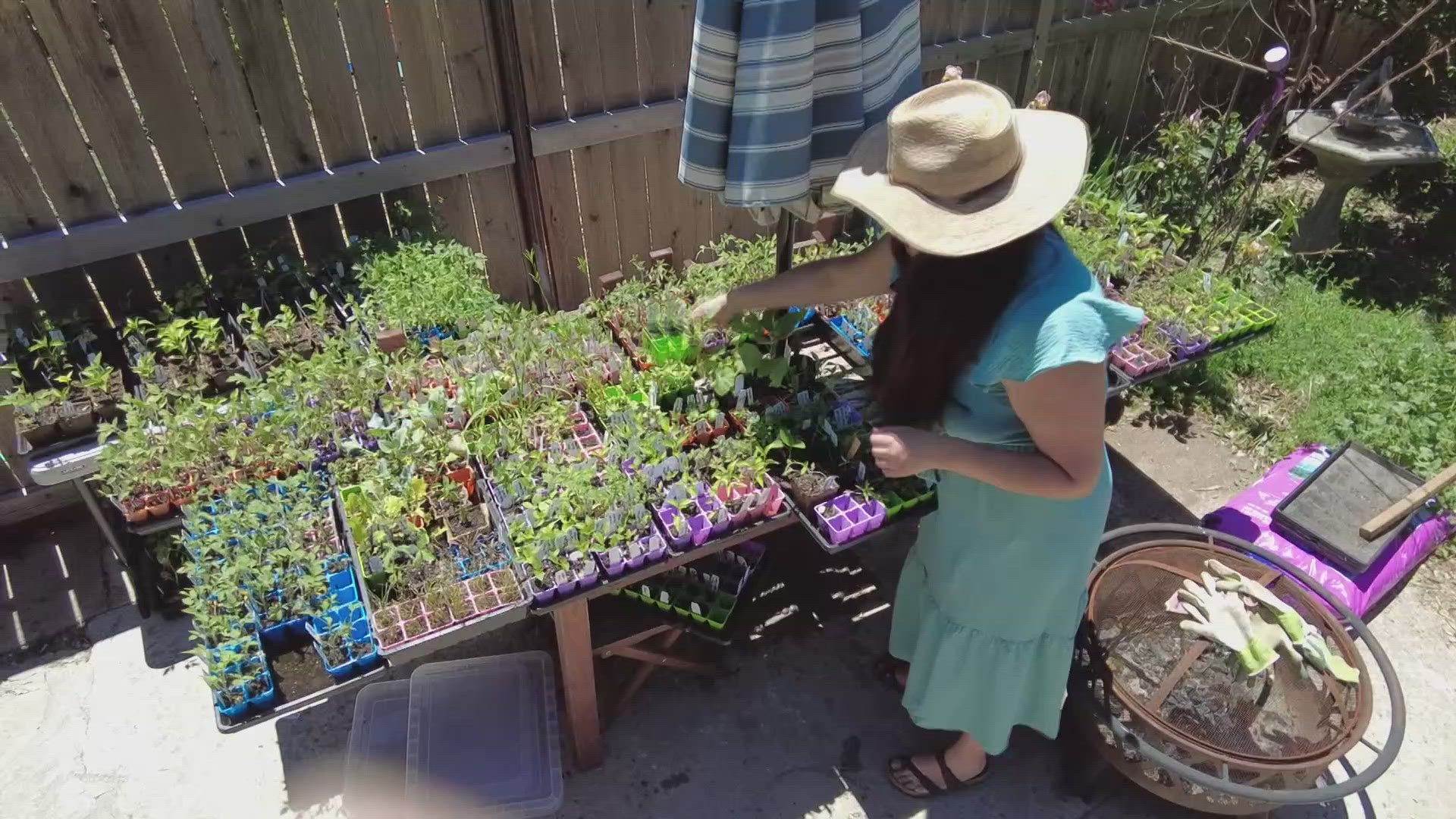DENVER, Colorado — Isabel Mendoza spends most of the year gardening, caring for seeds while they grow in her greenhouse before then planting them outside. Her gardening season usually begins in February or March by growing the seedlings.
"Everything I do here is organic, like from the seeds I buy to the all the potting soil that I use for the seedlings," Mendoza said.
Mendoza purchased her home in 2020 and each year has been expanding her garden and harvest. With years of growing, Mendoza has learned what works best like mixing flowers, tomatoes and peppers because it attracts pollinators. With her background in conservation, everything she uses is reusable starting with the cups she grows her seedlings in. Because they are made from cow manure, they also completely decompose by the end of the season.
"It's definitely a labor of love," Mendoza said. "Gardening is very relaxing and eating food that you know how it grows. I think you get to also appreciate how much work it goes into growing anything."
By now, she has already figured out her favorite produce to grow like San Marzano, Roma and Cherokee purple tomatoes.
Some of what she grows is in honor of her roots and culture like planting South American peppers.
"My grandparents had land, and they grew a lot of things, and I grew up in a place where, like, it's a spring all year. So, we always have fresh stuff and like, you would go to the coast and then there would be like a stand full of fruit all year long and we would eat seasonal, and it was great," Mendoza said, recalling memories from Ecuador. "I think I took that for granted."
During this year's harvest season, the extreme heat and lack of water were Mendoza's main challenges.
"This is Colorado, like things happen. I feel like you have to plan more to be able to get what you want.," Mendoza said. "If everything survives, then I also get extra to donate."
Every year, Mendoza donates everything she can. She used to give it to people who passed by the garden, friends and family. Now she donates to Fresh Food Connect, which will then distribute to organizations that help individuals and families facing food insecurity.
"It really doesn't take much extra effort," Mendoza said. "I think it's also in the spirit of gardening and growing food. I don't think this would be as much fun if I was just growing it for myself."
Fresh Food Connect helps both gardeners make sure their excess food does not go to waste while also solving the food insecurity crisis many face with rising living costs throughout the Denver metro area.
"We are trying to bring garden and homegrown produce into the hunger relief system here across all of Denver," Kayla Birdsong, CEO of Fresh Food Connect, said.
As a gardener herself, Birdsong knows she will end up with a whole bunch of the same produce all at once like zucchini or tomatoes.
"Fresh Food Connect was started back in 2016 here in Denver to solve the zucchini problem when you end up with a whole bunch of one thing, and you want to see that food going to where it's most needed," Birdsong said.
One in 10 Coloradans will face hunger and food insecurity, according to the organization.
"Small gardeners all the way up to expert gardeners like Isabel can make a big difference by sharing a little bit of what they have," Birdsong said.
The concept goes back to the idea of people building up this kind of community resiliency where neighbors are taking care of each other in their own neighborhoods.
"They're always looking for more fresh donations, and it really makes a huge difference to them to be able to add that food to what they're already distributing," Birdsong said. "Even a small amount can go a really long way."
Fresh Food Connect partners with 13 organizations like Kaizen Food Rescue and Project Worthmore.
"It's really meaningful to us because our local community is very supportive of our work and wanting to share their harvest with us and those who really have low or limited access to fresh food," Thai Nguyen, Founder of Kaizen Food Rescue, said.
Kaizen Food Rescue serves more than 6,000 people or families each week, rotating through about 18 locations to distribute goods. For example, it partners with other nonprofits and community organizations to have food shares that serve newcomers, refugees, immigrants and other people with limited fresh food access.
"It's so lovely to have something fresh grown by somebody in the community," said Nguyen, who says it's so important to make sure there's a process to share natural food. "We know that nutrient-rich foods are really hard to come by at the moment. People are so very grateful for, you know, organic fresh heirloom tomatoes."
Since its start, Kaizen has distributed more than 16.4 million pounds of food to more than 100,000 families.
"Part of growing food has a lot to do with sharing with people," Mendoza said.

